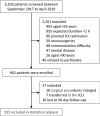Emergence delirium is associated with increased postoperative delirium in elderly: a prospective observational study
- PMID: 32507939
- PMCID: PMC7511467
- DOI: 10.1007/s00540-020-02805-8
Emergence delirium is associated with increased postoperative delirium in elderly: a prospective observational study
Abstract
Background: The clinical significance of emergence delirium remains unclear. The purpose of this study was to investigate the association between emergence delirium and postoperative delirium in elderly after general anesthesia and surgery.
Methods: This prospective observational study was done in a tertiary hospital in Beijing, China. Elderly patients (65-90 years) who underwent major noncardiac surgery under general anesthesia and admitted to the postanesthesia care unit (PACU) after surgery were enrolled. Emergence delirium was assessed with the Confusion Assessment Method for the Intensive Care Unit during PACU stay. Postoperative delirium was assessed with the Confusion Assessment Method during the first 5 postoperative days. The association between emergence delirium and postoperative delirium was analyzed with a multivariable logistic regression model.
Results: A total of 942 patients were enrolled and 915 completed the study. Emergence delirium developed in 37.0% (339/915) of patients during PACU stay; and postoperative delirium developed in 11.4% (104/915) of patients within the first 5 postoperative days. After adjusted confounding factors, the occurrence of emergence delirium is independently associated with an increased risk of postoperative delirium (OR 1.717, 95% CI 1.078-2.735, P = 0.023). Patients with emergence delirium stayed longer in PACU and hospital after surgery, and developed more non-delirium complications within 30 days.
Conclusions: Emergence delirium in elderly admitted to the PACU after general anesthesia and major surgery is independently associated with an increased risk of postoperative delirium. Patients with emergence delirium had worse perioperative outcomes. Chinese Clinical Trial Registry (chictr.org.cn) ChiCTR-OOC-17012734.
Keywords: Elderly; Emergence delirium; General anesthesia; Major surgery; Postoperative delirium.
Conflict of interest statement
The authors declare no conflict of interests.
Figures
References
-
- Evered L, Silbert B, Knopman DS, Scott DA, DeKosky ST, Rasmussen LS, Oh ES, Crosby G, Berger M, Eckenhoff RG, Nomenclature Consensus Working G Recommendations for the nomenclature of cognitive change associated with anaesthesia and surgery-2018. Br J Anaesth. 2018;121:1005–1012. doi: 10.1016/j.bja.2017.11.087. - DOI - PMC - PubMed
-
- Radtke FM, Franck M, Hagemann L. Risk factors for inadequate emergence after anesthesia: emergence delirium and hypoactive emergence. Minerva Anestesiol. 2010;76:394–403. - PubMed
Publication types
MeSH terms
Associated data
LinkOut - more resources
Full Text Sources
Medical




